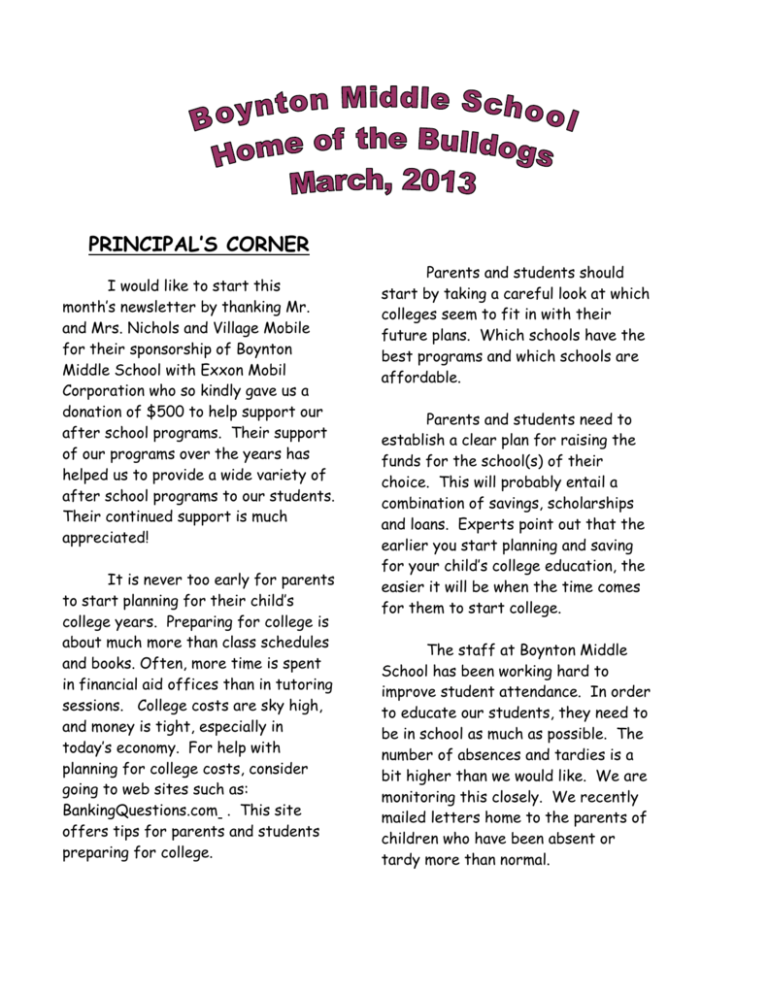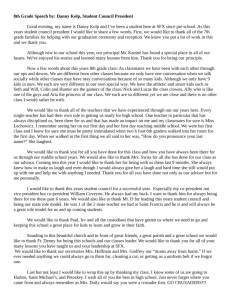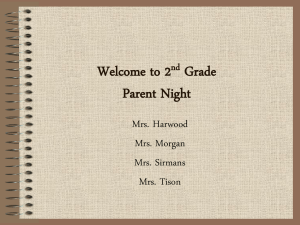Newsletter March 2013 - Mascenic Regional School District
advertisement

PRINCIPAL’S CORNER I would like to start this month’s newsletter by thanking Mr. and Mrs. Nichols and Village Mobile for their sponsorship of Boynton Middle School with Exxon Mobil Corporation who so kindly gave us a donation of $500 to help support our after school programs. Their support of our programs over the years has helped us to provide a wide variety of after school programs to our students. Their continued support is much appreciated! It is never too early for parents to start planning for their child’s college years. Preparing for college is about much more than class schedules and books. Often, more time is spent in financial aid offices than in tutoring sessions. College costs are sky high, and money is tight, especially in today’s economy. For help with planning for college costs, consider going to web sites such as: BankingQuestions.com . This site offers tips for parents and students preparing for college. Parents and students should start by taking a careful look at which colleges seem to fit in with their future plans. Which schools have the best programs and which schools are affordable. Parents and students need to establish a clear plan for raising the funds for the school(s) of their choice. This will probably entail a combination of savings, scholarships and loans. Experts point out that the earlier you start planning and saving for your child’s college education, the easier it will be when the time comes for them to start college. The staff at Boynton Middle School has been working hard to improve student attendance. In order to educate our students, they need to be in school as much as possible. The number of absences and tardies is a bit higher than we would like. We are monitoring this closely. We recently mailed letters home to the parents of children who have been absent or tardy more than normal. Learning Outside Of School After studying all week, your middle grader is tired of learning, right? Wrong! Your child may be tired of sitting in class, but he’s still eager to learn. Your child’s interest in all sorts of things doesn’t end at school. Here’s how several parents keep their kids learning on the weekends. Sunday comics “My son Rob is always saying witty things. When I suggested he write down his oneliners, he turned his jokes into an essay called ‘The Rob Report.’ Talk about funny! I encouraged him to submit it to our community newspaper. The staff liked it so much, they’ve asked him to write another article for next Sunday’s edition.” Saturdays at the shop “Ask my daughter Jenny to write a poem, and she chews her lip. But fixing cars is something she enjoys. Every weekend her dad teaches her how to repair engines at his shop. As he puts it, ‘Sonnets may frustrate her, but sockets make her happy!’” Tough talk Kids sometimes ask their parents how they behaved as children. Questions like “Did you use drugs?” may signal your child’s curiosity about risky behaviors. Consider a response such as “Why do you ask?” to encourage your middle grader to discuss what’s on her mind. The average middle grader spends about 17 hours a week online and 14 hours watching television. But most kids devote only six hours a week to reading for pleasure. Suggest that your child cut down on Web and TV time and read a magazine or listen to music instead 5th Grade News Ms. Pope's fifth grade reading classes have been enjoying the adventure and details in the book: Chasing Lincoln's Killer by James L. Swanson. There has been a lot of discussion about why someone would want to hurt a president as well as discussions about the Confederacy and slavery. The students have a required amount of reading that they should do as homework each night Monday through Friday. This amount is different for each student and depends on the book they have chosen and their reading rate. Weekends should be used to catch up. In class, students are writing letters to me about how they are reacting to and analyzing the books they are reading. They are also writing book reviews about books they have finished. The students' ideas and analysis of books have really expanded since the beginning of the year. We Are Collecting Box Tops Please send in your Labels from Campbell’s products, and Tyson Chicken products. Help us through the Box tops For Education program. They all add up! 6th Grade News Social Studies- We have traveled across the ocean to the Middle East and North Africa. Students are learning why the world's attention is focused on this region. Reading- We are currently working on reading fluency and memorizing a 40 line poem by Ogden Nash entitled "Adventures of Isabel". Our other focus is a historical fiction about civil rights. Science-As amateur geologists, we are studying rocks and minerals. We will be looking at soil samples collected from our homes. (before the snow fell!) Teach Kids How to Stand Up to a Bully It's not just "kid stuff" that your child will have to live with. The effects of bullying and teasing can cause depression and anger that can last for years. Schools are well aware of this and are establishing programs and policies to prevent or respond to the problem. But parents need to be involved too. The behavior is most common in sixth- to eighth-graders. Bullies often target kids who are shy and sensitive, but also pick those who are smarter than they are or different in some way. Or they choose a victim for no reason. If the abuse is physical, resulting in torn clothes or bruises, and it occurred on school property or at a school activity; parents should contact the school immediately. If the abuse is verbal, parents can help solve the problem and increase children's self-confidence. Teach them to: LA- We are anxiously awaiting our replies from the Great American Mail Race. Currently, we are studying various sentence structures. Students will soon be creating their own characters which will be used in several assignments. Math- Mrs. White has just received a Promethean Board! She is working very hard learning all that can be done. Her students are a huge help! Avoid the bully. Take a different route to class or ask for a change in the location of your locker. Ask to sit at the front of the bus or the class. Stand tall. Just acting brave can be enough to make a bully lose interest. Feel good about yourself. Exercise so you look and feel more fit. Wear clean clothes. Ignore him or her. Walk away and pretend not to hear the teasing. Bullies want a big reaction to their meanness, so give no reaction at all. Practice a few responses. When they insult you, say, "That's not cool," or if they say your hair is red or you are fat, say, "Thanks for pointing that out. I didn't know it before!" Or say "No, stop it!" Don't show that you're afraid, angry, or upset. That's what they want. Get involved in a club or an organization that interests you. Find a friend. a broken bone heals? The skeletal/muscular system has been the focus of study, and we will be moving on to circulatory/respiratory systems soon as well as digestive/excretory, learning how all the systems are interrelated and keep the body functioning. If your students share what they are learning with you, you can look forward to some “fun facts”! Electronic bullying can be especially hurtful because it follows the child home. If insults are anonymous, parents can contact the Internet provider to identify the bully. Often he or she will stop if identified. If the child knows who the bully is and the bullying doesn't stop, change the child's email address. Give the new one out only to trusted friends. 7th Grade Language Art has been analyzing the different components of a newspaper as part of their information writing unit. The students will then create their own newspaper using one of the Microsoft Office newspaper templates. The papers will include an original news article after completing research on their topic, games, an advice column and or letter to the editor. 7th Grade News The 7th grade Math classes have been working on a unit exploring transformations we had a fun time translating, rotating and reflecting geometric shapes on the coordinate plane. Our current adventure is learning about significant digits and applying geometrical Over the next few weeks the 7th grade civics class will be introduced to their new unit on The Legal System. The unit will be taught by our new student teacher Mr. Gregg French from Keene State College. There will be many different components to this unit which rage from the differences between civil and criminal law as well as how our court systems function. Mr. French will be with us until mid-May and the seventh grade teachers as well as students are very excited to be working with him. Has your 7th grade student been reciting the names of the bones to you, or explaining the wonders of how formulas in real life situations. We will be using conversion units while solving formulas for perimeter, area and volume. We will be investigating the wonderful number Pi! National Pi day is March 14th and we will be doing activities to celebrate. Grade 7 readers have recently completed the novel Nothing but the Truth by Avi. It is a story about telling the "whole truth and nothing but the truth" and the consequences that occur when the truth is distorted. We read the novel orally in class so that each student got a chance to read one of the parts in the novel. We focused on characterization, inference, predictions, vocabulary and situational irony. The students enjoyed reading the novel but were a bit upset with the conclusion. Ask them about it. We are currently working on Study and Test Taking Skills with hopes that with more practice in these areas, grades and understanding of material will improve. We are all waiting and hoping for Spring to arrive soon! Do Your Homework on Helping Kids with Theirs When you have school-aged children, homework is a fact of life. But it doesn't have to be unpleasant. Do your part to help your child get the most from his or her homework with this advice: Show your interest. Ask children about their homework assignments. Talk about why they're important and what the child can learn from them. You need to show that homework is important and worthwhile. Establish a routine. Set aside regular time for homework--right after dinner, perhaps. This helps the child get into the habit of beginning on time. Eliminate distractions. Turn off the TV and radio, and provide adequate space where your child can work without being bothered by siblings, parents making dinner, etc. Help your child prioritize. Time management is essential. Your child should keep a notebook or log all of his or her assignments so none are forgotten. Advise children to identify which assignments will be most difficult and time-consuming so they can start on those when they're fresh. Offer help--within limits. Don't do their homework for them. If they get stuck, ask questions and guide them through the difficulties so they're doing the work themselves. Otherwise they won't learn the subject--or responsibility for doing their own work. Praise their efforts. Getting the right answer is important, but so is supporting the process. Praise them for working hard and not giving up when they're tired or frustrated. Give them a break. Let children take short breaks if they start to get too frustrated with a particular assignment. You don't want a complete meltdown over an arithmetic problem. Work with the teacher. Stay in contact with your children's teachers so you know what their expectations are--for the child and for you as a parent. We have started the Jackson Era unit with a challenging assignment on the Monroe Doctrine. Students are reading the document the United States issued to European nations and will explain how advances in transportation, communication and weapons made foreign policy change over the past 200 years. 8th Grade News The 8th grade has recently modified the use of their seminar time at the end of the day. Three days a week this time is used for students to receive additional help in classes, work on make-up work and absent work, and finish assignments. On Wednesdays, the 8th grade team is teaching various writing and study skills, the results of which have been seen on various assessments! Keep up the good work! Mrs. Pogorzelski’s Social Studies classes have just completed a unit on the Jefferson Era. Students were asked to rank the first four presidents, Washington, Adams, Jefferson and Madison, in order from the best president to the worst, based on their accomplishments during their presidencies. Mrs. Farwell’s Reading class is previewing what student’s will be learning about in Science through the New York Times Best Seller George’s Secret Key to the Universe, by Lucy and Stephen Hawking. This book discusses the solar system, mass, earth, comets, and matter in an interesting and fun way. As different topics are discussed, Mrs. Farwell will be incorporating video clips to reinforce the subject matter. In Mrs. Ryan's Language classes, the students are finishing a photo journalism story and then moving on to business and careers. In this unit, they will use Microsoft publisher and create resumes and then send business letters to local companies. The letters are to show case their commercial voices to praise a company, or to offer suggestions on ways to better their product or company for the young adult sector. They will also participate in mock, face to face interviews with a human resource director from the New Ipswich community. In Spanish, students are reviewing information about likes/dislikes, adjectives, and activities from before vacation with grammar activities and a short dialog skit. The students are also working on a research project about "paises hispanohablantes" (Spanishspeaking countries). They are working in groups to gather information about a country of their choice, including geography, demographics, history, tourism, food, and cultural traditions. Their presentations will be March 12th and 13th. The students are very enthusiastic about the project. Real Friendships Need Face-to-Face or Voice-to-Voice Contact By the time you communicate with your 50 to 100 friends on social websites, there seems to be little opportunity to visit or telephone anyone else. In the United States and across the world, actual friends are being replaced by acquaintances. Electronic contacts are replacing the joy and satisfaction of human contact. Television, two-career families, suburban sprawl, and personal values mean that fewer people belong to organizations, clubs, or churches. In his book, Bowling Alone, Robert Putnam says we have a growing deficit of "social capital." He equates his own experience to bowling, which he once did with teams and organizations. Now people often bowl alone. In the United Kingdom, the Mental Health Foundation has published The Lonely Society. It says about half of Brits believe they are living in a lonelier society. One in three would like to be closer to family, but social trends are driving them apart. Today, the average American has only two close friends, and a quarter of Americans say they don't have any. Shallow friendships prevail, like those with pals on the Internet. Sociologists say they are very worried about the decline in social connections in the United States. A connection with another person may be only a click away, but cultivating a friendship takes more. Mental health authorities say there is a secret to close friendship: Put down the device and engage the person. Spend some face-to-face time with a friend even if you "should" be doing something else. At least talk in person on the telephone. CHESS CLUB We have all heard the expression “Music is the universal language.” I have always felt that there is another universal language – chess. It is commonly believed to have originated in India some 1,500 years ago. From there it spread to Persia and the rest of the world, including Europe, where it developed into the game that is played in virtually every country in the world today. It’s no wonder, as there are so many things we can learn from playing and studying the game. We learn patience, concentration, pattern recognition, managing time and resources, planning ahead, how to turn obstacles into opportunities, and how to develop and execute good ideas. But if you walk by the library on a Tuesday afterschool, you would never guess that we are learning all of these things, because, frankly, it looks like we’re just having too much fun! If you would like to join us, we still have room for a few more students. Please contact the main office if you are interested! Mr. Rogers and the Boynton Chess Club NURSE’S NOTES Thank you to all the parents who responded so quickly and positively to make sure that current information on immunizations for their children is on file with the School Nurse. Many of the current records also came with current physical exams which are also very helpful and useful for your children. Please contact me if you would like a copy of these for your home records. Our immunization clinic went very well and our students were wonderful. Cindy Watts, RN from the NH Department of Communicable Diseases and the student nurses from St. Anselm’s College were very impressed with their attitudes and behavior. Please be sure to get a copy of current immunization records and physical exams for the School Nurse each time your children have updates on this with their doctors. Again, thank you for being so prompt and helpful. It is greatly appreciated. Kathy Chase BMS RN






